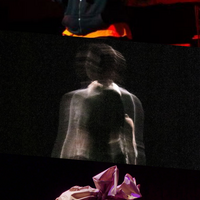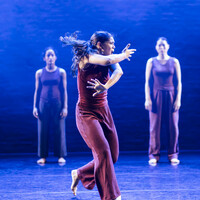Wed 18 May: Nadenh Poan/Karlo Company/ Ester Natzijl Projects

News Story
Nadenh Poan REFLECTIONS
Karlo Company Now & Then
Ester Natzijl Projects Finding Grace
In REFLECTIONS, choreographer Nadenh Poan uses text – both English and Khmer – to contemplate his experience as a disabled child raised in Cambodia, while a pair of dancers animate his meditations with tight, grounded contemporary dance. Emily Lue-Fong and Christian Brinklow synchronise beautifully: she’s sturdy and centred, moving seamlessly between levels; he’s forceful, long-legged, radiating heat even in his stiller moments. There are lots of dynamics at play here, and they’re deftly balanced, creating a thoughtful, intimate sense of tension.
Karlo Company’s Now & Then also looks inward, this time to reflect on change. Two dancers, dressed identically, portray halves of a single person, playing out the before and after of an untold traumatic event. Before is sinuous, elastic, full of deep stretches that sink into the curves of Ciaran O’Donovan’s pensive score. A foot whips upwards and sends a wave through the whole body. After is jumpy, cutting, all curled wrists and thrusting hips. The idea of division is etched into the stage design itself, these contrasting solos occurring either side of a cut-through marked in tape – an on-the-nose but effective dividing line.
I can’t imagine there are many performers out there aligning pointework and puppetry, but Ester Natzijl shows how to do so with panache in Finding Grace, an oblique dive into self-control. Wielding a silvery marionette, a skeletal creature that morphs from animal to human to alien in her nimble fingers, Natzijl pitches us a four-step plan to “becoming a puppeteer of yourself,” a move that promises grace and self-realisation, she tells us. Her character is an interesting inverse of the hollow cult leader who lures you in with charisma; her argument actually makes sense, but the undertones are sinister, especially as she begins to glitch, crooking her head like her own strings are being jerked. Recorded real-life interviews discussing the meaning of grace tug the register in a competing direction – where does the sincerity start and the irony end? – but the meditative finale affirms it as a sharp, layered piece of dance theatre.
Sara Veale
Nadenh Poan’s choreography is atmospheric, with dancers Christian Brinklow and Emliy Lue-Fong lending their extraordinarily complimentary physicality and intensity to this series of intimate Reflections. Lined with Cambodian influence, the accompaniment elicits a charging rhythm, grounding Brinklow and Lue-Fong as they dart with a spiralling synchronicity. Their unison is most impressive, seemingly existing along the same vibrational frequency; the pair move with an astonishingly low centre of gravity, grounded in even the most elevated movements. The piece is embedded with punctuation in what feels like a series of reflective entries connected by semicolons; in moments of pause the choreography breathes with vibrancy, weaving a tapestry of memory.
Karlo Company’s performance hangs poignantly in the present whist skilfully navigating the Now & Then. Pavlina Karlo’s choreography exhibits a well held and sustained flow, with Kristyna Kocianova and Angnieszka Mencel able to evaporate their surroundings, moving with maturity and sensitivity. The pair envelop one another, offering support and suspension in spiralling sequences. This fluidity is juxtaposed by moments of torment, expressed with a laboured active weight and contorted, twisting torsos. The Now & Then is demarcated via the use of tape, slicing diagonally across the space. Even more powerful is the use of lighting, supporting the blurred separation between past and present, suggesting the osmosis of trauma, able to move with us between the Now & Then.
“Something bigger and greater is controlling us…pulling us around like fucking marionettes. To our strings, we are subjects. We are all an entangled, graceless mess.” A complete sensory overload, Ester Natzijl’s Finding Grace intertwines spoken word, ballet vocabulary, physical theatre, and puppetry in a twenty minute, existential, socio-political punch. Natzijl demonstrates intense precision as she manipulates a small, skeletal, deer-like marionette. Unsettling at times, Finding Grace offers a morass of choreographic and audio/visual devices, ritualistically attempting to escape the confines of the strings we find ourselves suspended from. Whilst brimming with variety, most intriguing is Natzijl’s demonstration of puppetry; her movements canon that of the marionette, emphasising broken lines and cyclical patterns. In some moments Natzijl manipulates her marionette, in others, the marionette manipulates Natzijl.
Jodie Nunn


